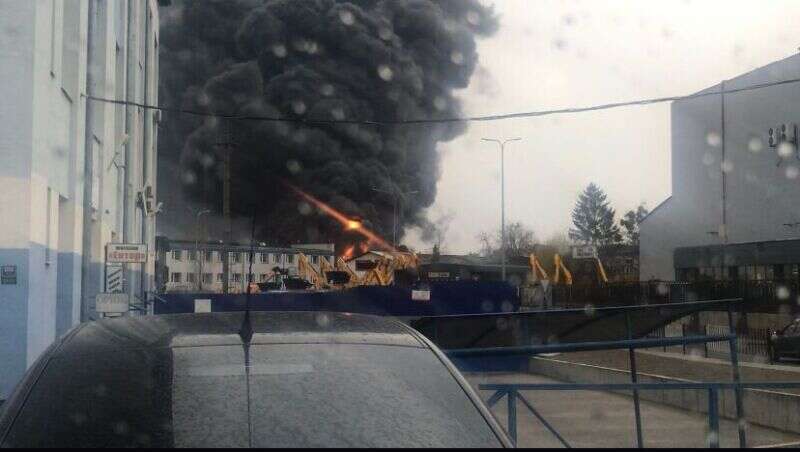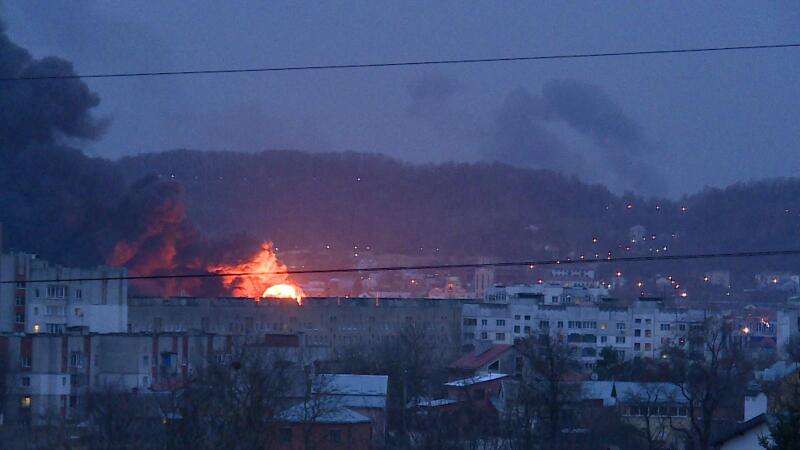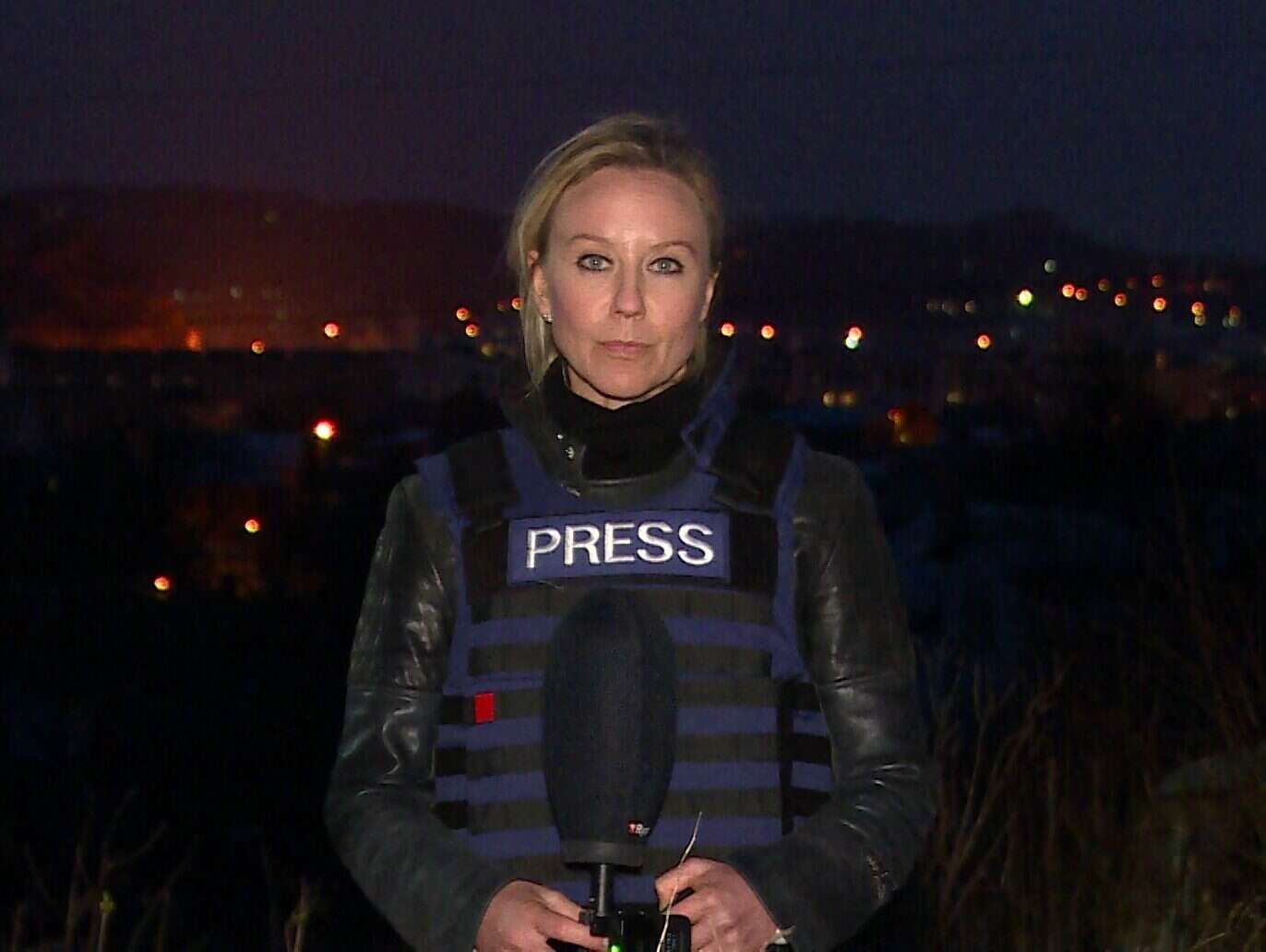
Sky News correspondent Sally Lockwood has written an exclusive diary for Press Gazette from Lviv in western Ukraine.
She revealed the increasing difficulties being faced by journalists in Ukraine, with reports that a new law may be introduced to ban filming of the scenes of Russian attacks.
Lockwood, whose own media accreditation was briefly revoked for reasons thought likely to be related to Sky’s coverage of the weekend’s attacks in Lviv, said the situation has “become very delicate” for journalists, with her team threatened with arrest and even faced with hostility from locals.
Read on for her full diary from 24-27 March.
Read our previous journalist diaries from Ukraine:
- Mark Austin, Sky News (part one)
- Mark Austin, Sky News (part two)
- Tessa Chapman, 5 News
- John Sweeney, freelance
Thursday 24 March
A month of war. It’s a grim milestone. In that time a quarter of Ukraine has been made homeless. Tens of thousands of them have sought safety in the western city of Lviv. At the main train station, stories of struggle pack every platform. Parents piling on and off trains with their children, babies, with little plan for what happens next.
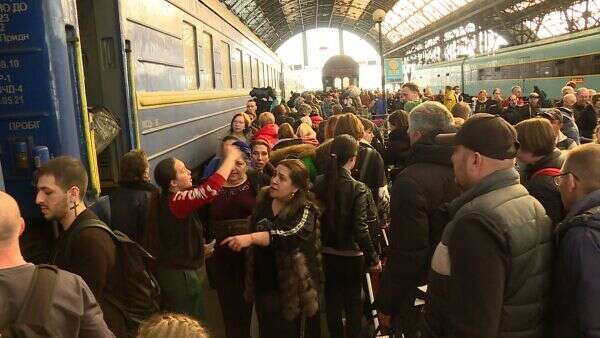
Dispatch from Sky News correspondent Sally Lockwood in Lviv, Ukraine. Picture: Sky News
We meet three generations of women from one family who’ve managed to make it here from the devastated city of Mariupol. The grandmother tells us she wouldn’t wish what they’ve been through on their Russian neighbours. Another family who’ve escaped shelling in Kyiv say they left when their seven-year-old became too frightened to sleep. So many of the children we see here don’t laugh or cry. Perhaps it’s because they see so many of their parents in tears. I worry what is going through their minds. God knows what they make of this war and the impact it’s having on their young lives.
Friday 25 March
Finally some news from the theatre in Mariupol. It’s taken well over a week but we’ve learned for the first time that eyewitnesses estimate 300 people died in the bombing of a building sheltering more than a thousand civilians. A building that had the word “children” marked in the ground outside and was clearly visible from the air.
One of the few ways news is now reaching the outside world from Mariupol is from the brave people who’ve manage to escape. One woman, Diana, who used to live next to the theatre, has made it to Lviv and tells me it’s worse than anything you can imagine. She tells us women who were in the maternity unit that was bombed just days before had been taken to the theatre for safety. Understanding the hell unfolding in Mariupol is getting harder – the city, largely without power, internet and phone signal. The people still trapped there can no longer be heard – they need our reporting more than ever.
Saturday 26 March
We see how quickly things can change.
Lviv is bustling with people in the afternoon sunshine.
As we’re driving away from the centre of town, we hear reports of jets overhead. A few minutes later the air raid siren is heard across the city. People here are very used to it but this time it feels different.
Three loud explosions follow, and a large black cloud of smoke begins to grow over the city’s skyline. The sense of safety, in a city that has offered protection to so many, is shattered in a matter of minutes.
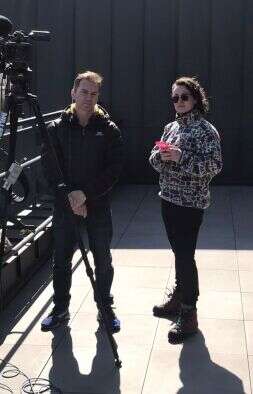
Sky producer Sophie Alexander, and Sky cameraman Ronnie Dewhurst in Lviv, Ukraine. Picture: Sky News
With Sky producer Sophie Alexander and Sky cameraman Ronnie Dewhurst, we make it to the scene before a cordon had been put in place. A huge fire is burning through a fuel depot, perilously close to two petrol stations and a number of apartment blocks.
It is chaos, as you would expect. Police and the military yelling at people to clear the scene. There are high winds and the fire is in danger of spreading fast – but the biggest fear is a secondary attack. That fear is realised. As we’re preparing to go live on air, Sophie and our security advisor are pointing behind me with a sense of urgency. More bangs and huge flashes light up the sky. Another cloud of smoke grows behind me, killing the confidence that Lviv is a city of sanctuary.
Sunday 27 March
Emotions are high among people here. Ukrainians are going through so much. But we feel that at its most visceral in the wake of the attack on Lviv. The sense of panic is expected but what we didn’t foresee was the intense paranoia from police and many locals that anyone filming near the scene of the missile strikes could be helping the Russians. In the initial aftermath we saw several arrests, officers examining people’s mobile phones.
As journalists, our work is being hampered too. We were told by police we’d be arrested if we filmed anywhere near the explosions. More than 12 hours on, it is still a challenge. We encounter a hostility among locals who see us with a camera near the smouldering fuel depot that was hit first. One man covered Ronnie’s lens and pushed it away. We later learn that my media accreditation had been revoked. We aren’t given any details as to why, but the assumption is it’s to do with our coverage or my tweets of the attack the day before. After a few phone calls from our fixers, an hour later my accreditation is reinstated. We’re now hearing a new media law is being introduced to ban any filming of the scenes of Russian attacks. In a country where we’ve felt largely welcome until now, reporting on breaking events has become very delicate indeed.
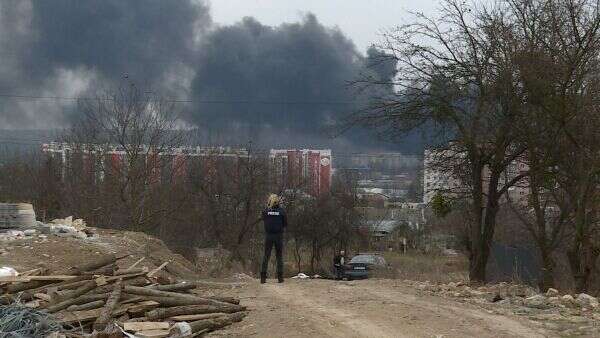
Dispatch from Sky News correspondent Sally Lockwood in Lviv, Ukraine. Picture: Sky News
Pictures: Sky News
Email pged@pressgazette.co.uk to point out mistakes, provide story tips or send in a letter for publication on our "Letters Page" blog

